Benner's Theory and NMBA Standards in Nursing Practice
VerifiedAdded on 2022/08/25
|8
|2048
|24
Essay
AI Summary
This essay thoroughly examines Patricia Benner's "From Novice to Expert" theory and its application within nursing practice. It begins with an introduction to Benner's core concept, which emphasizes the development of nursing skills through a combination of strong educational foundations and personal experiences. The essay then provides an in-depth outline of Benner's theory, describing the five stages of clinical competence: novice, advanced beginner, competent, proficient, and expert, and how nurses progress through these stages. The essay also defines advanced practice nursing (APN) and differentiates the roles and functions of novice versus advanced nurses. Furthermore, it relates Benner's theory to the Nursing and Midwifery Board of Australia (NMBA) standards of practice, highlighting how the theory supports nurses in achieving proficiency and providing appropriate patient care. The discussion incorporates a minimum of ten references, supporting the analysis with relevant literature and research.
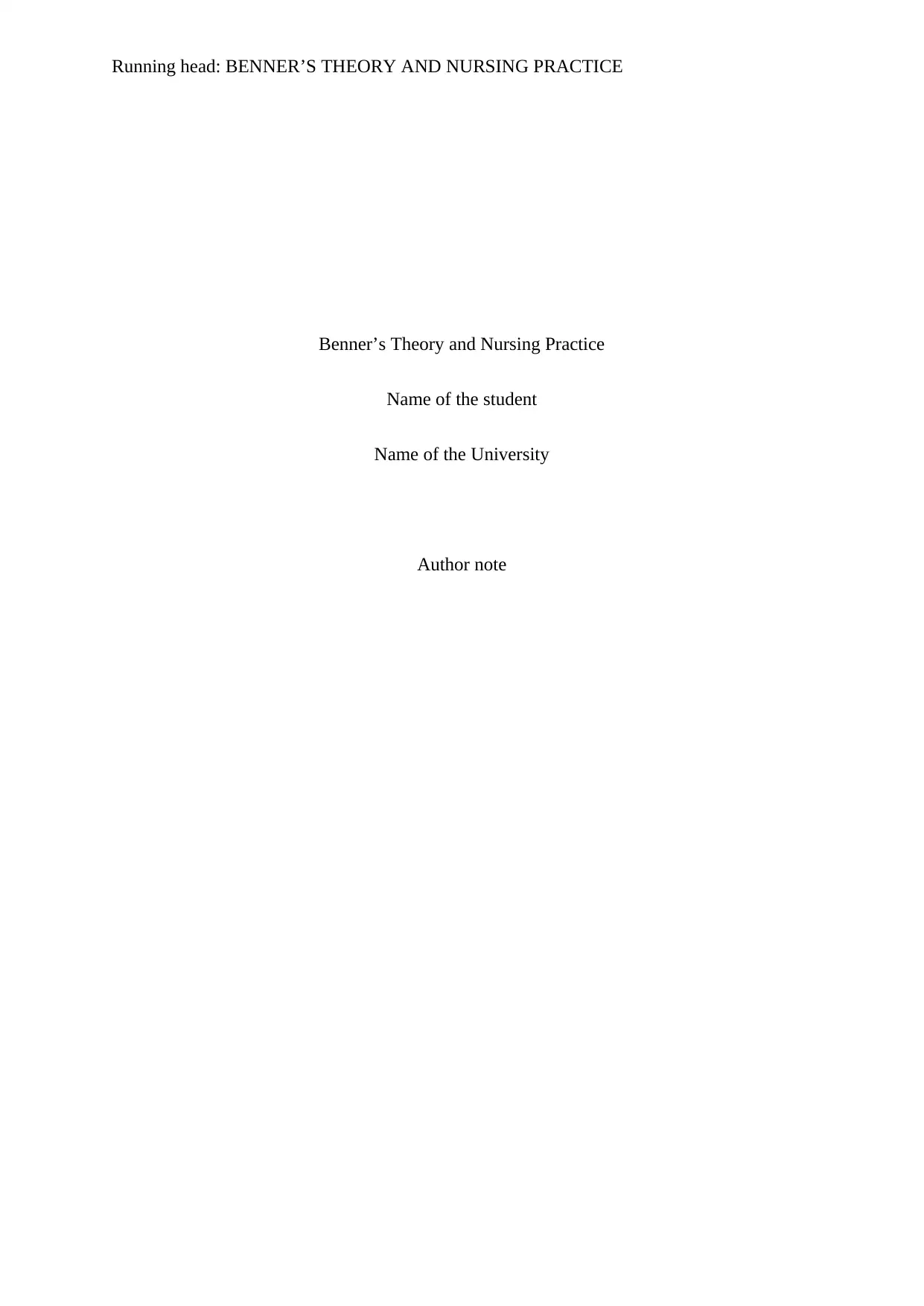
Running head: BENNER’S THEORY AND NURSING PRACTICE
Benner’s Theory and Nursing Practice
Name of the student
Name of the University
Author note
Benner’s Theory and Nursing Practice
Name of the student
Name of the University
Author note
Paraphrase This Document
Need a fresh take? Get an instant paraphrase of this document with our AI Paraphraser
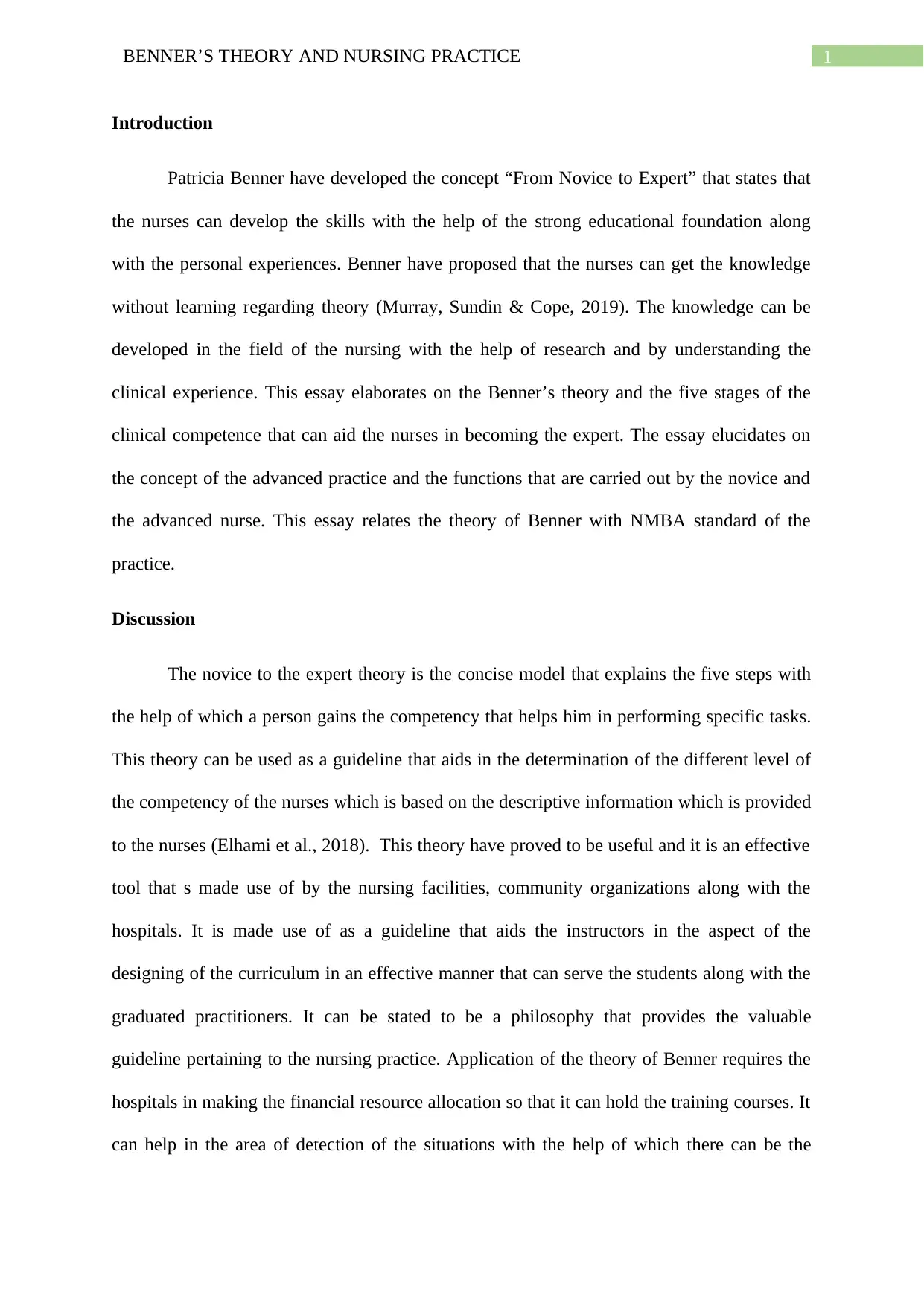
1BENNER’S THEORY AND NURSING PRACTICE
Introduction
Patricia Benner have developed the concept “From Novice to Expert” that states that
the nurses can develop the skills with the help of the strong educational foundation along
with the personal experiences. Benner have proposed that the nurses can get the knowledge
without learning regarding theory (Murray, Sundin & Cope, 2019). The knowledge can be
developed in the field of the nursing with the help of research and by understanding the
clinical experience. This essay elaborates on the Benner’s theory and the five stages of the
clinical competence that can aid the nurses in becoming the expert. The essay elucidates on
the concept of the advanced practice and the functions that are carried out by the novice and
the advanced nurse. This essay relates the theory of Benner with NMBA standard of the
practice.
Discussion
The novice to the expert theory is the concise model that explains the five steps with
the help of which a person gains the competency that helps him in performing specific tasks.
This theory can be used as a guideline that aids in the determination of the different level of
the competency of the nurses which is based on the descriptive information which is provided
to the nurses (Elhami et al., 2018). This theory have proved to be useful and it is an effective
tool that s made use of by the nursing facilities, community organizations along with the
hospitals. It is made use of as a guideline that aids the instructors in the aspect of the
designing of the curriculum in an effective manner that can serve the students along with the
graduated practitioners. It can be stated to be a philosophy that provides the valuable
guideline pertaining to the nursing practice. Application of the theory of Benner requires the
hospitals in making the financial resource allocation so that it can hold the training courses. It
can help in the area of detection of the situations with the help of which there can be the
Introduction
Patricia Benner have developed the concept “From Novice to Expert” that states that
the nurses can develop the skills with the help of the strong educational foundation along
with the personal experiences. Benner have proposed that the nurses can get the knowledge
without learning regarding theory (Murray, Sundin & Cope, 2019). The knowledge can be
developed in the field of the nursing with the help of research and by understanding the
clinical experience. This essay elaborates on the Benner’s theory and the five stages of the
clinical competence that can aid the nurses in becoming the expert. The essay elucidates on
the concept of the advanced practice and the functions that are carried out by the novice and
the advanced nurse. This essay relates the theory of Benner with NMBA standard of the
practice.
Discussion
The novice to the expert theory is the concise model that explains the five steps with
the help of which a person gains the competency that helps him in performing specific tasks.
This theory can be used as a guideline that aids in the determination of the different level of
the competency of the nurses which is based on the descriptive information which is provided
to the nurses (Elhami et al., 2018). This theory have proved to be useful and it is an effective
tool that s made use of by the nursing facilities, community organizations along with the
hospitals. It is made use of as a guideline that aids the instructors in the aspect of the
designing of the curriculum in an effective manner that can serve the students along with the
graduated practitioners. It can be stated to be a philosophy that provides the valuable
guideline pertaining to the nursing practice. Application of the theory of Benner requires the
hospitals in making the financial resource allocation so that it can hold the training courses. It
can help in the area of detection of the situations with the help of which there can be the
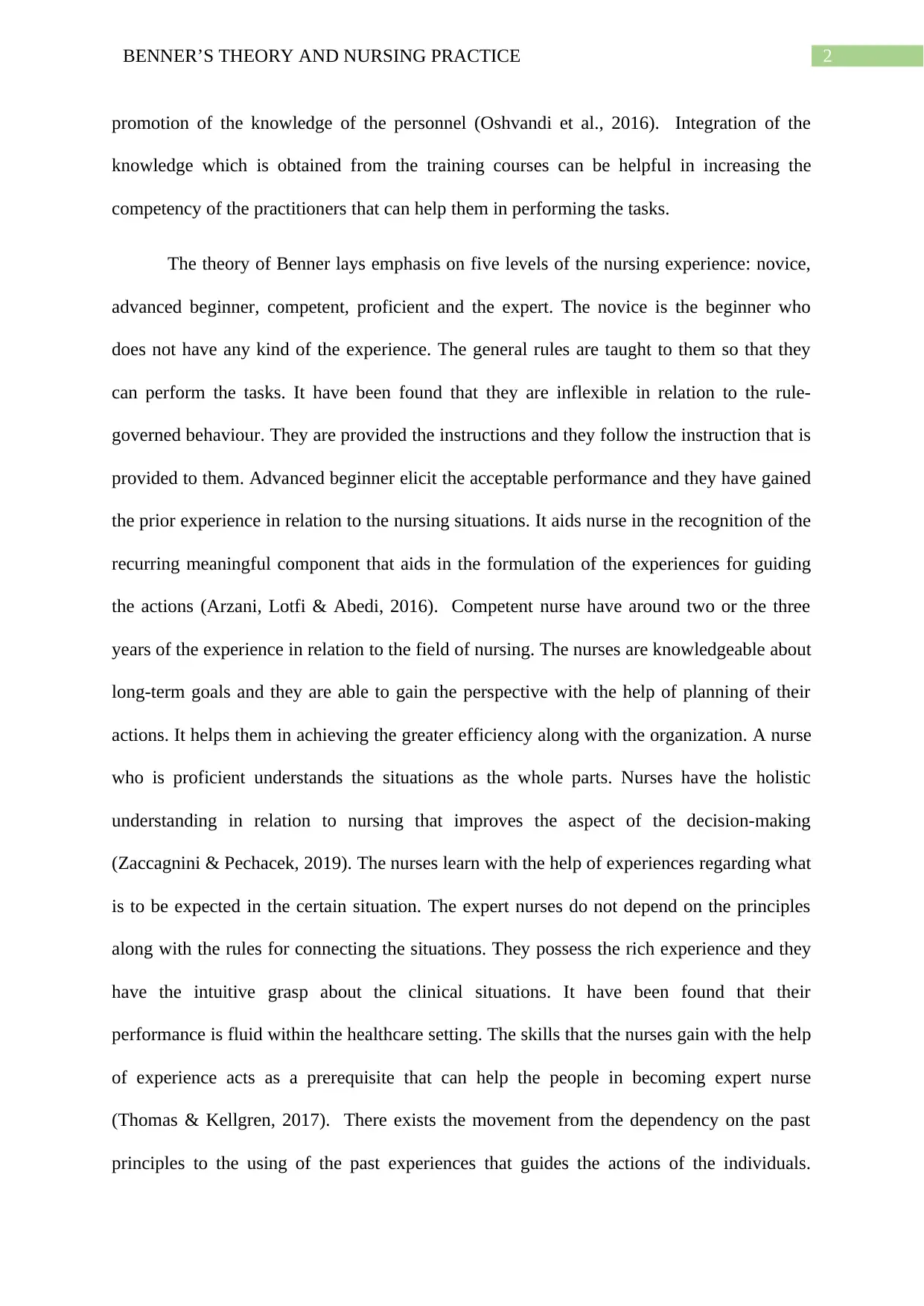
2BENNER’S THEORY AND NURSING PRACTICE
promotion of the knowledge of the personnel (Oshvandi et al., 2016). Integration of the
knowledge which is obtained from the training courses can be helpful in increasing the
competency of the practitioners that can help them in performing the tasks.
The theory of Benner lays emphasis on five levels of the nursing experience: novice,
advanced beginner, competent, proficient and the expert. The novice is the beginner who
does not have any kind of the experience. The general rules are taught to them so that they
can perform the tasks. It have been found that they are inflexible in relation to the rule-
governed behaviour. They are provided the instructions and they follow the instruction that is
provided to them. Advanced beginner elicit the acceptable performance and they have gained
the prior experience in relation to the nursing situations. It aids nurse in the recognition of the
recurring meaningful component that aids in the formulation of the experiences for guiding
the actions (Arzani, Lotfi & Abedi, 2016). Competent nurse have around two or the three
years of the experience in relation to the field of nursing. The nurses are knowledgeable about
long-term goals and they are able to gain the perspective with the help of planning of their
actions. It helps them in achieving the greater efficiency along with the organization. A nurse
who is proficient understands the situations as the whole parts. Nurses have the holistic
understanding in relation to nursing that improves the aspect of the decision-making
(Zaccagnini & Pechacek, 2019). The nurses learn with the help of experiences regarding what
is to be expected in the certain situation. The expert nurses do not depend on the principles
along with the rules for connecting the situations. They possess the rich experience and they
have the intuitive grasp about the clinical situations. It have been found that their
performance is fluid within the healthcare setting. The skills that the nurses gain with the help
of experience acts as a prerequisite that can help the people in becoming expert nurse
(Thomas & Kellgren, 2017). There exists the movement from the dependency on the past
principles to the using of the past experiences that guides the actions of the individuals.
promotion of the knowledge of the personnel (Oshvandi et al., 2016). Integration of the
knowledge which is obtained from the training courses can be helpful in increasing the
competency of the practitioners that can help them in performing the tasks.
The theory of Benner lays emphasis on five levels of the nursing experience: novice,
advanced beginner, competent, proficient and the expert. The novice is the beginner who
does not have any kind of the experience. The general rules are taught to them so that they
can perform the tasks. It have been found that they are inflexible in relation to the rule-
governed behaviour. They are provided the instructions and they follow the instruction that is
provided to them. Advanced beginner elicit the acceptable performance and they have gained
the prior experience in relation to the nursing situations. It aids nurse in the recognition of the
recurring meaningful component that aids in the formulation of the experiences for guiding
the actions (Arzani, Lotfi & Abedi, 2016). Competent nurse have around two or the three
years of the experience in relation to the field of nursing. The nurses are knowledgeable about
long-term goals and they are able to gain the perspective with the help of planning of their
actions. It helps them in achieving the greater efficiency along with the organization. A nurse
who is proficient understands the situations as the whole parts. Nurses have the holistic
understanding in relation to nursing that improves the aspect of the decision-making
(Zaccagnini & Pechacek, 2019). The nurses learn with the help of experiences regarding what
is to be expected in the certain situation. The expert nurses do not depend on the principles
along with the rules for connecting the situations. They possess the rich experience and they
have the intuitive grasp about the clinical situations. It have been found that their
performance is fluid within the healthcare setting. The skills that the nurses gain with the help
of experience acts as a prerequisite that can help the people in becoming expert nurse
(Thomas & Kellgren, 2017). There exists the movement from the dependency on the past
principles to the using of the past experiences that guides the actions of the individuals.
⊘ This is a preview!⊘
Do you want full access?
Subscribe today to unlock all pages.

Trusted by 1+ million students worldwide
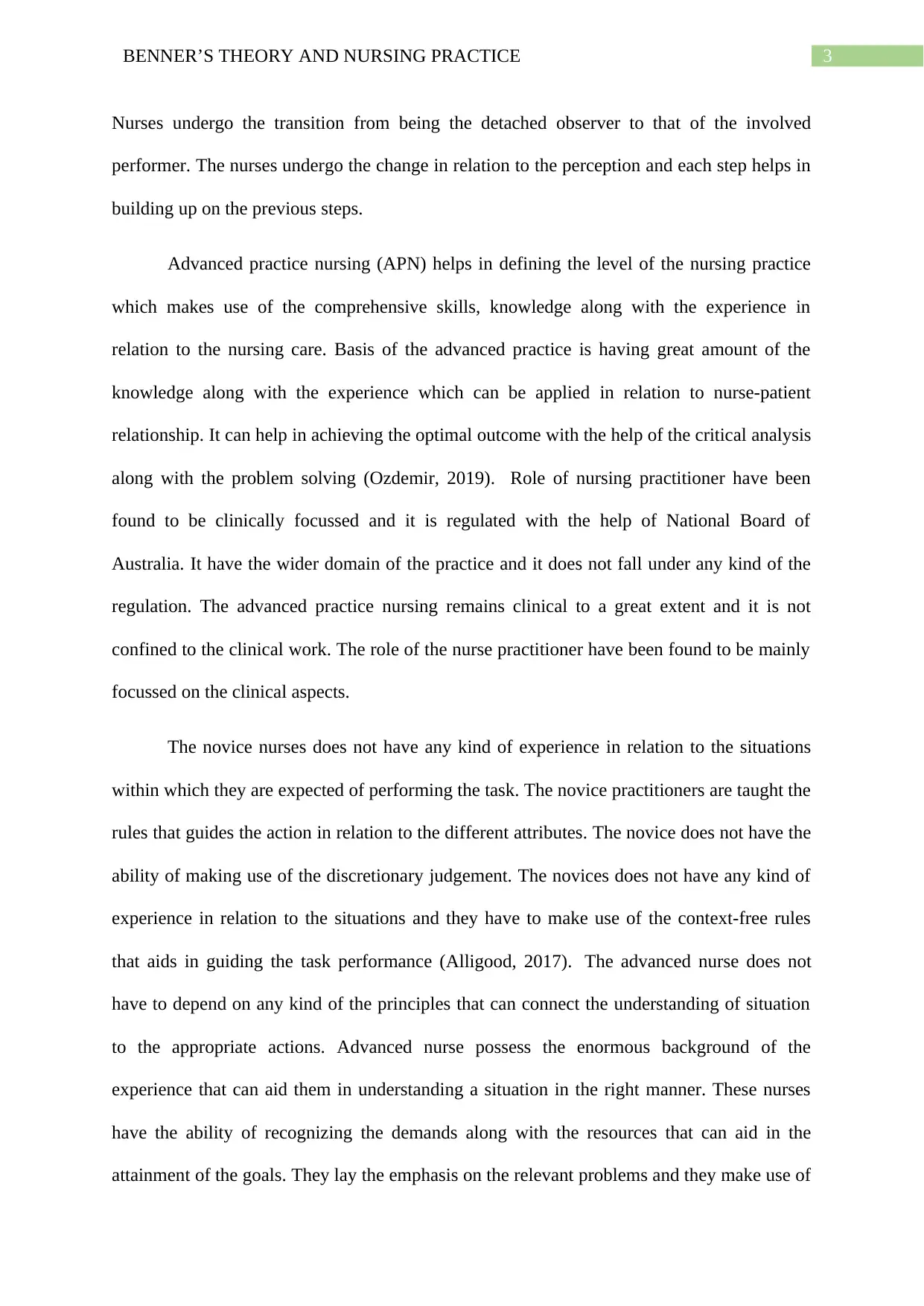
3BENNER’S THEORY AND NURSING PRACTICE
Nurses undergo the transition from being the detached observer to that of the involved
performer. The nurses undergo the change in relation to the perception and each step helps in
building up on the previous steps.
Advanced practice nursing (APN) helps in defining the level of the nursing practice
which makes use of the comprehensive skills, knowledge along with the experience in
relation to the nursing care. Basis of the advanced practice is having great amount of the
knowledge along with the experience which can be applied in relation to nurse-patient
relationship. It can help in achieving the optimal outcome with the help of the critical analysis
along with the problem solving (Ozdemir, 2019). Role of nursing practitioner have been
found to be clinically focussed and it is regulated with the help of National Board of
Australia. It have the wider domain of the practice and it does not fall under any kind of the
regulation. The advanced practice nursing remains clinical to a great extent and it is not
confined to the clinical work. The role of the nurse practitioner have been found to be mainly
focussed on the clinical aspects.
The novice nurses does not have any kind of experience in relation to the situations
within which they are expected of performing the task. The novice practitioners are taught the
rules that guides the action in relation to the different attributes. The novice does not have the
ability of making use of the discretionary judgement. The novices does not have any kind of
experience in relation to the situations and they have to make use of the context-free rules
that aids in guiding the task performance (Alligood, 2017). The advanced nurse does not
have to depend on any kind of the principles that can connect the understanding of situation
to the appropriate actions. Advanced nurse possess the enormous background of the
experience that can aid them in understanding a situation in the right manner. These nurses
have the ability of recognizing the demands along with the resources that can aid in the
attainment of the goals. They lay the emphasis on the relevant problems and they make use of
Nurses undergo the transition from being the detached observer to that of the involved
performer. The nurses undergo the change in relation to the perception and each step helps in
building up on the previous steps.
Advanced practice nursing (APN) helps in defining the level of the nursing practice
which makes use of the comprehensive skills, knowledge along with the experience in
relation to the nursing care. Basis of the advanced practice is having great amount of the
knowledge along with the experience which can be applied in relation to nurse-patient
relationship. It can help in achieving the optimal outcome with the help of the critical analysis
along with the problem solving (Ozdemir, 2019). Role of nursing practitioner have been
found to be clinically focussed and it is regulated with the help of National Board of
Australia. It have the wider domain of the practice and it does not fall under any kind of the
regulation. The advanced practice nursing remains clinical to a great extent and it is not
confined to the clinical work. The role of the nurse practitioner have been found to be mainly
focussed on the clinical aspects.
The novice nurses does not have any kind of experience in relation to the situations
within which they are expected of performing the task. The novice practitioners are taught the
rules that guides the action in relation to the different attributes. The novice does not have the
ability of making use of the discretionary judgement. The novices does not have any kind of
experience in relation to the situations and they have to make use of the context-free rules
that aids in guiding the task performance (Alligood, 2017). The advanced nurse does not
have to depend on any kind of the principles that can connect the understanding of situation
to the appropriate actions. Advanced nurse possess the enormous background of the
experience that can aid them in understanding a situation in the right manner. These nurses
have the ability of recognizing the demands along with the resources that can aid in the
attainment of the goals. They lay the emphasis on the relevant problems and they make use of
Paraphrase This Document
Need a fresh take? Get an instant paraphrase of this document with our AI Paraphraser
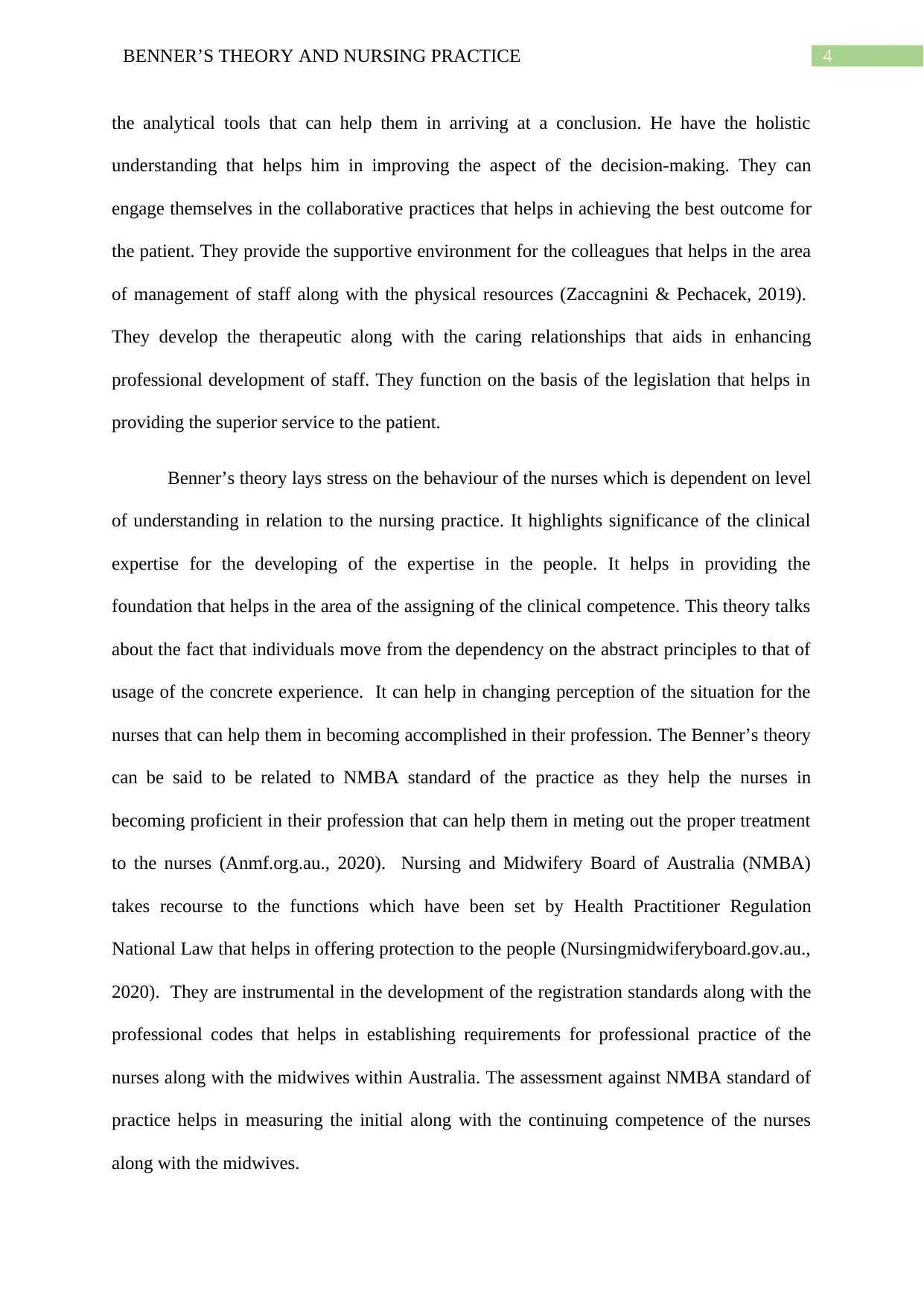
4BENNER’S THEORY AND NURSING PRACTICE
the analytical tools that can help them in arriving at a conclusion. He have the holistic
understanding that helps him in improving the aspect of the decision-making. They can
engage themselves in the collaborative practices that helps in achieving the best outcome for
the patient. They provide the supportive environment for the colleagues that helps in the area
of management of staff along with the physical resources (Zaccagnini & Pechacek, 2019).
They develop the therapeutic along with the caring relationships that aids in enhancing
professional development of staff. They function on the basis of the legislation that helps in
providing the superior service to the patient.
Benner’s theory lays stress on the behaviour of the nurses which is dependent on level
of understanding in relation to the nursing practice. It highlights significance of the clinical
expertise for the developing of the expertise in the people. It helps in providing the
foundation that helps in the area of the assigning of the clinical competence. This theory talks
about the fact that individuals move from the dependency on the abstract principles to that of
usage of the concrete experience. It can help in changing perception of the situation for the
nurses that can help them in becoming accomplished in their profession. The Benner’s theory
can be said to be related to NMBA standard of the practice as they help the nurses in
becoming proficient in their profession that can help them in meting out the proper treatment
to the nurses (Anmf.org.au., 2020). Nursing and Midwifery Board of Australia (NMBA)
takes recourse to the functions which have been set by Health Practitioner Regulation
National Law that helps in offering protection to the people (Nursingmidwiferyboard.gov.au.,
2020). They are instrumental in the development of the registration standards along with the
professional codes that helps in establishing requirements for professional practice of the
nurses along with the midwives within Australia. The assessment against NMBA standard of
practice helps in measuring the initial along with the continuing competence of the nurses
along with the midwives.
the analytical tools that can help them in arriving at a conclusion. He have the holistic
understanding that helps him in improving the aspect of the decision-making. They can
engage themselves in the collaborative practices that helps in achieving the best outcome for
the patient. They provide the supportive environment for the colleagues that helps in the area
of management of staff along with the physical resources (Zaccagnini & Pechacek, 2019).
They develop the therapeutic along with the caring relationships that aids in enhancing
professional development of staff. They function on the basis of the legislation that helps in
providing the superior service to the patient.
Benner’s theory lays stress on the behaviour of the nurses which is dependent on level
of understanding in relation to the nursing practice. It highlights significance of the clinical
expertise for the developing of the expertise in the people. It helps in providing the
foundation that helps in the area of the assigning of the clinical competence. This theory talks
about the fact that individuals move from the dependency on the abstract principles to that of
usage of the concrete experience. It can help in changing perception of the situation for the
nurses that can help them in becoming accomplished in their profession. The Benner’s theory
can be said to be related to NMBA standard of the practice as they help the nurses in
becoming proficient in their profession that can help them in meting out the proper treatment
to the nurses (Anmf.org.au., 2020). Nursing and Midwifery Board of Australia (NMBA)
takes recourse to the functions which have been set by Health Practitioner Regulation
National Law that helps in offering protection to the people (Nursingmidwiferyboard.gov.au.,
2020). They are instrumental in the development of the registration standards along with the
professional codes that helps in establishing requirements for professional practice of the
nurses along with the midwives within Australia. The assessment against NMBA standard of
practice helps in measuring the initial along with the continuing competence of the nurses
along with the midwives.
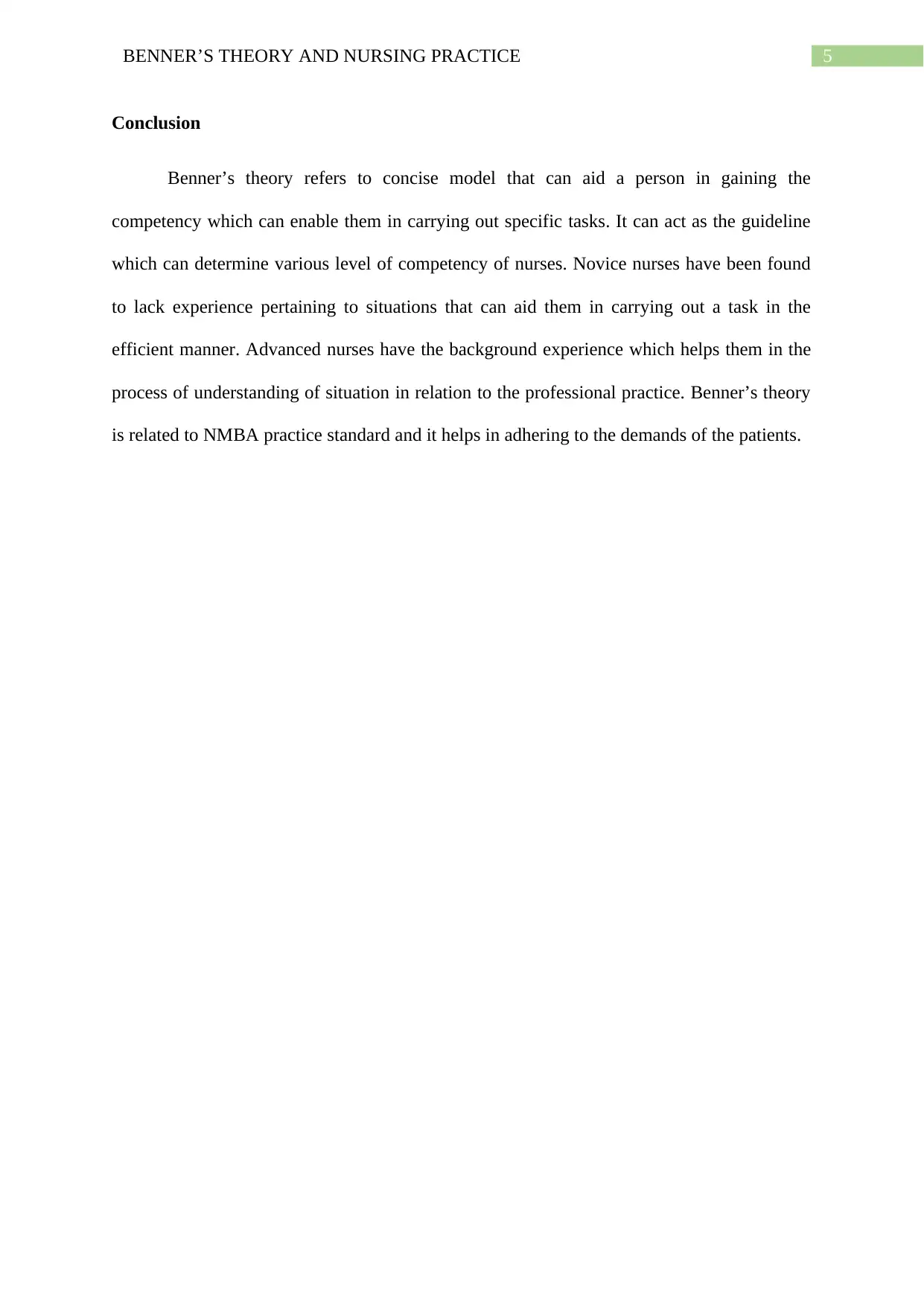
5BENNER’S THEORY AND NURSING PRACTICE
Conclusion
Benner’s theory refers to concise model that can aid a person in gaining the
competency which can enable them in carrying out specific tasks. It can act as the guideline
which can determine various level of competency of nurses. Novice nurses have been found
to lack experience pertaining to situations that can aid them in carrying out a task in the
efficient manner. Advanced nurses have the background experience which helps them in the
process of understanding of situation in relation to the professional practice. Benner’s theory
is related to NMBA practice standard and it helps in adhering to the demands of the patients.
Conclusion
Benner’s theory refers to concise model that can aid a person in gaining the
competency which can enable them in carrying out specific tasks. It can act as the guideline
which can determine various level of competency of nurses. Novice nurses have been found
to lack experience pertaining to situations that can aid them in carrying out a task in the
efficient manner. Advanced nurses have the background experience which helps them in the
process of understanding of situation in relation to the professional practice. Benner’s theory
is related to NMBA practice standard and it helps in adhering to the demands of the patients.
⊘ This is a preview!⊘
Do you want full access?
Subscribe today to unlock all pages.

Trusted by 1+ million students worldwide
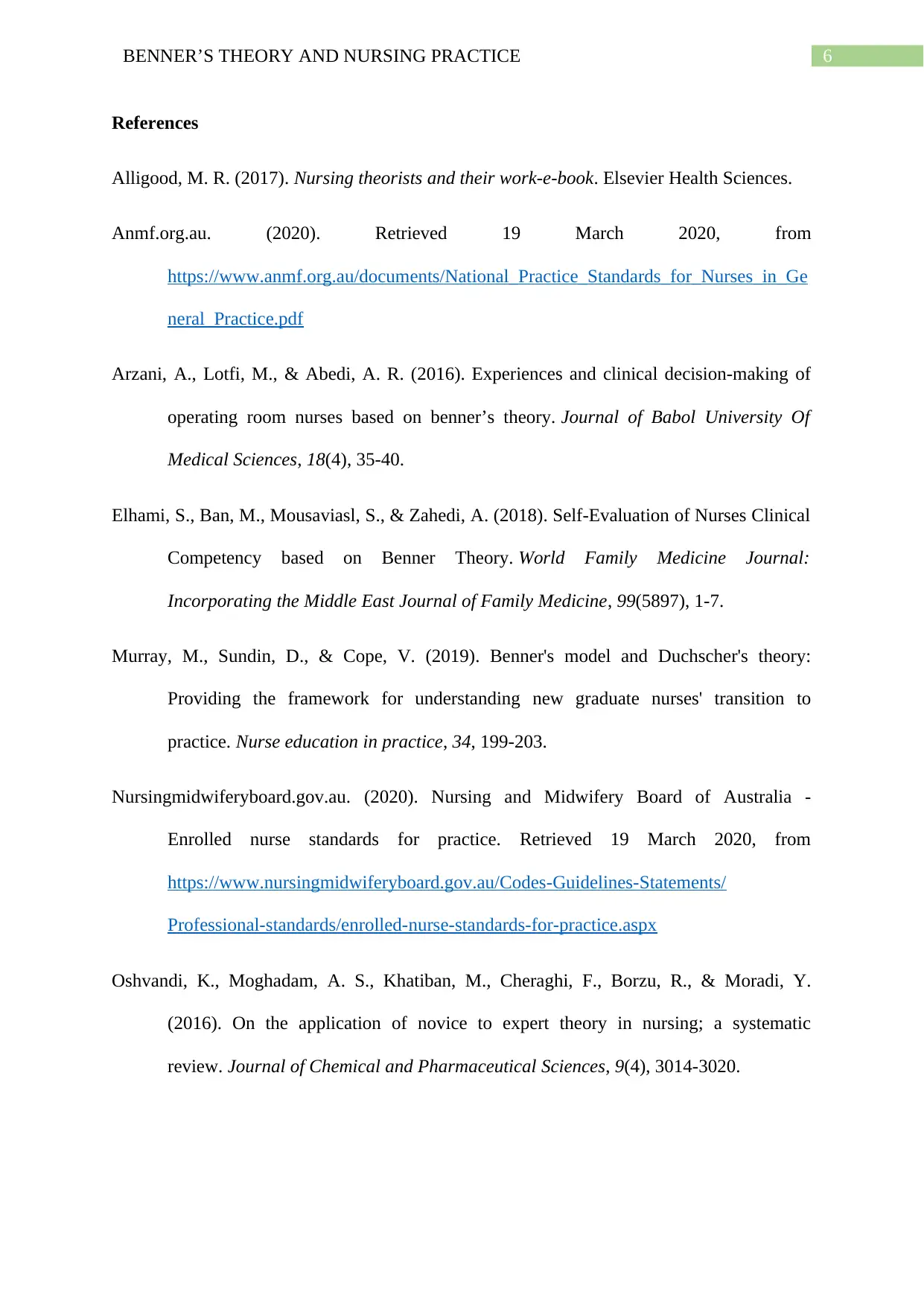
6BENNER’S THEORY AND NURSING PRACTICE
References
Alligood, M. R. (2017). Nursing theorists and their work-e-book. Elsevier Health Sciences.
Anmf.org.au. (2020). Retrieved 19 March 2020, from
https://www.anmf.org.au/documents/National_Practice_Standards_for_Nurses_in_Ge
neral_Practice.pdf
Arzani, A., Lotfi, M., & Abedi, A. R. (2016). Experiences and clinical decision-making of
operating room nurses based on benner’s theory. Journal of Babol University Of
Medical Sciences, 18(4), 35-40.
Elhami, S., Ban, M., Mousaviasl, S., & Zahedi, A. (2018). Self-Evaluation of Nurses Clinical
Competency based on Benner Theory. World Family Medicine Journal:
Incorporating the Middle East Journal of Family Medicine, 99(5897), 1-7.
Murray, M., Sundin, D., & Cope, V. (2019). Benner's model and Duchscher's theory:
Providing the framework for understanding new graduate nurses' transition to
practice. Nurse education in practice, 34, 199-203.
Nursingmidwiferyboard.gov.au. (2020). Nursing and Midwifery Board of Australia -
Enrolled nurse standards for practice. Retrieved 19 March 2020, from
https://www.nursingmidwiferyboard.gov.au/Codes-Guidelines-Statements/
Professional-standards/enrolled-nurse-standards-for-practice.aspx
Oshvandi, K., Moghadam, A. S., Khatiban, M., Cheraghi, F., Borzu, R., & Moradi, Y.
(2016). On the application of novice to expert theory in nursing; a systematic
review. Journal of Chemical and Pharmaceutical Sciences, 9(4), 3014-3020.
References
Alligood, M. R. (2017). Nursing theorists and their work-e-book. Elsevier Health Sciences.
Anmf.org.au. (2020). Retrieved 19 March 2020, from
https://www.anmf.org.au/documents/National_Practice_Standards_for_Nurses_in_Ge
neral_Practice.pdf
Arzani, A., Lotfi, M., & Abedi, A. R. (2016). Experiences and clinical decision-making of
operating room nurses based on benner’s theory. Journal of Babol University Of
Medical Sciences, 18(4), 35-40.
Elhami, S., Ban, M., Mousaviasl, S., & Zahedi, A. (2018). Self-Evaluation of Nurses Clinical
Competency based on Benner Theory. World Family Medicine Journal:
Incorporating the Middle East Journal of Family Medicine, 99(5897), 1-7.
Murray, M., Sundin, D., & Cope, V. (2019). Benner's model and Duchscher's theory:
Providing the framework for understanding new graduate nurses' transition to
practice. Nurse education in practice, 34, 199-203.
Nursingmidwiferyboard.gov.au. (2020). Nursing and Midwifery Board of Australia -
Enrolled nurse standards for practice. Retrieved 19 March 2020, from
https://www.nursingmidwiferyboard.gov.au/Codes-Guidelines-Statements/
Professional-standards/enrolled-nurse-standards-for-practice.aspx
Oshvandi, K., Moghadam, A. S., Khatiban, M., Cheraghi, F., Borzu, R., & Moradi, Y.
(2016). On the application of novice to expert theory in nursing; a systematic
review. Journal of Chemical and Pharmaceutical Sciences, 9(4), 3014-3020.
Paraphrase This Document
Need a fresh take? Get an instant paraphrase of this document with our AI Paraphraser
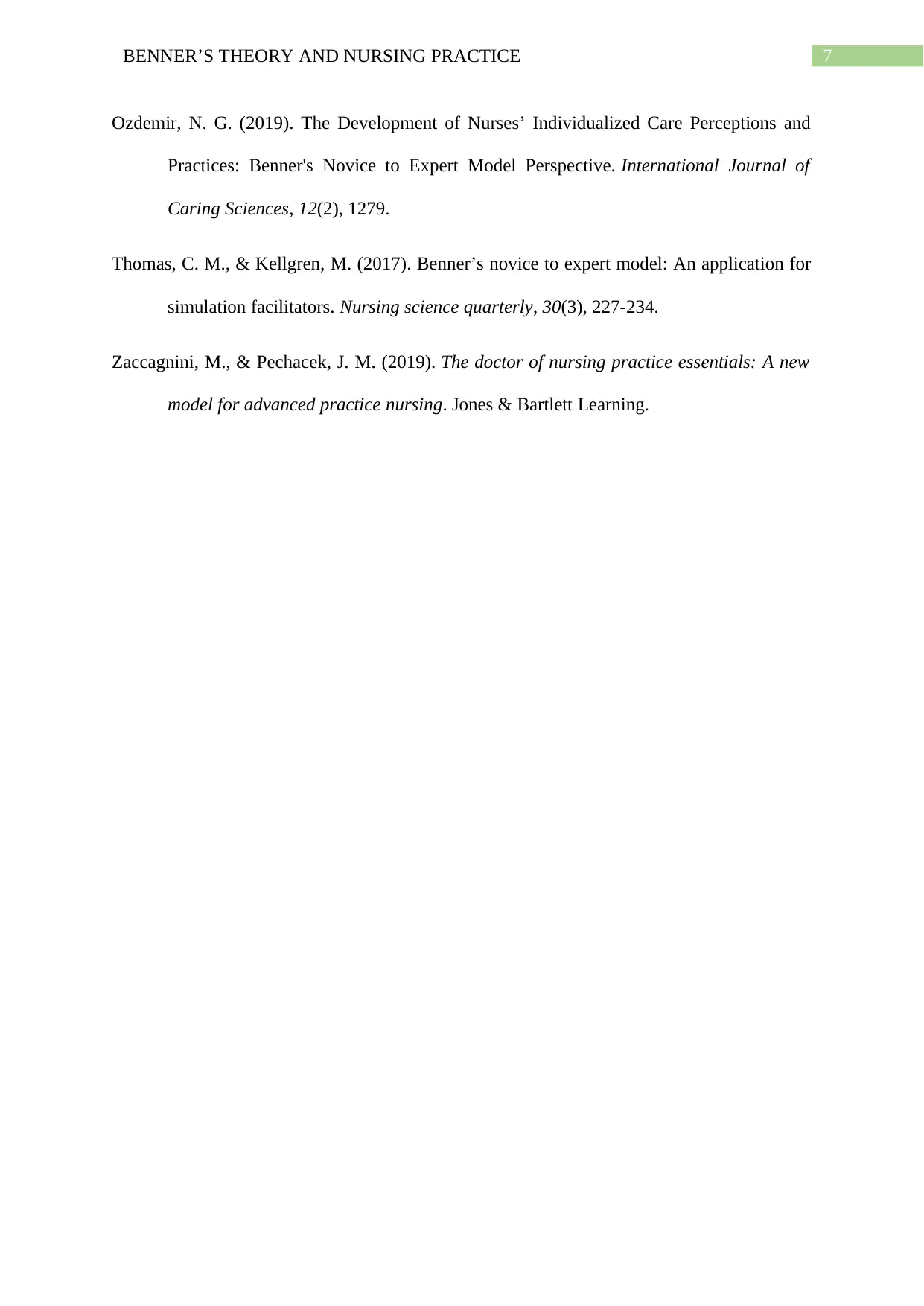
7BENNER’S THEORY AND NURSING PRACTICE
Ozdemir, N. G. (2019). The Development of Nurses’ Individualized Care Perceptions and
Practices: Benner's Novice to Expert Model Perspective. International Journal of
Caring Sciences, 12(2), 1279.
Thomas, C. M., & Kellgren, M. (2017). Benner’s novice to expert model: An application for
simulation facilitators. Nursing science quarterly, 30(3), 227-234.
Zaccagnini, M., & Pechacek, J. M. (2019). The doctor of nursing practice essentials: A new
model for advanced practice nursing. Jones & Bartlett Learning.
Ozdemir, N. G. (2019). The Development of Nurses’ Individualized Care Perceptions and
Practices: Benner's Novice to Expert Model Perspective. International Journal of
Caring Sciences, 12(2), 1279.
Thomas, C. M., & Kellgren, M. (2017). Benner’s novice to expert model: An application for
simulation facilitators. Nursing science quarterly, 30(3), 227-234.
Zaccagnini, M., & Pechacek, J. M. (2019). The doctor of nursing practice essentials: A new
model for advanced practice nursing. Jones & Bartlett Learning.
1 out of 8
Related Documents
Your All-in-One AI-Powered Toolkit for Academic Success.
+13062052269
info@desklib.com
Available 24*7 on WhatsApp / Email
![[object Object]](/_next/static/media/star-bottom.7253800d.svg)
Unlock your academic potential
Copyright © 2020–2025 A2Z Services. All Rights Reserved. Developed and managed by ZUCOL.





